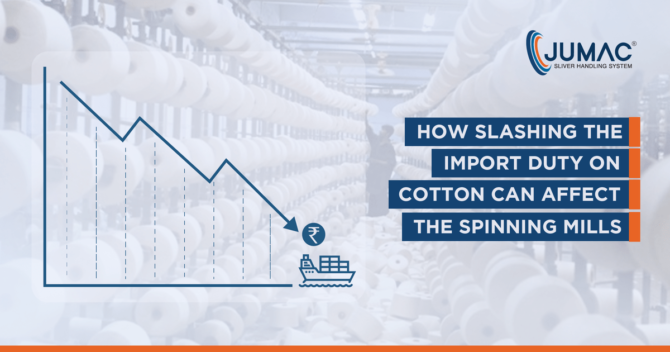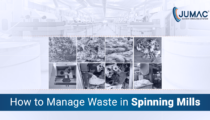The legacy of the Indian textile industry is one for…

How Slashing The Import Duty On Cotton Is Likely To Affect Spinning Mills
The winds of change are well and truly blowing, as far as the Indian cotton and textile sector is concerned. The Australia-India ECTA (Economic Cooperation & Trade Agreement) – which will bolster textile exports significantly through preferential market access – has already been hailed by industry leaders. Yet another important update from last month was the removal of import duty on cotton for a period of five-and-a-half months (from 14 April to September 30 this year). Right from spinning mills to cotton suppliers and spinning can manufacturers, the news of cotton import duties being slashed opens up a plethora of benefits. Let us here take a look at how slashing the cotton import duty can affect spinning mills:
Availability Of Cotton At Competitive Rates; Support From International Markets
To stay competitive, the Indian textile sector needs the support of favourable government policies. The news of cotton import duties being slashed has come as a welcome one in this regard. It is widely expected that this policy shift will bolster the availability of cotton at highly competitive rates. The robust worldwide logistical support will help in maintaining price stability.
As a result of the removal of the import duties, cotton imports in the domestic markets will significantly ease. The average trading price of cotton is expected to go down by ~₹5500 per candy. Thanks to the ‘softer prices’, Indian cotton imports should increase in a big way. Between October 2021 and September 2022, Indian cotton imports are projected to be around the 2.5 million bales mark.
A Buffer Against Cotton Production Uncertainties
At present, there is a 5% AIDC cess (Agriculture Infrastructure Development cess) on cotton imports. A further 5% import duty is levied as Basic Customs Duty (or, BCD). In a country like India, where sudden & unseasonal rainfall often affects cotton production, such high import duties serve as roadblocks – both for domestic & international buyers, and for the textile sector as a whole.
In the international markets, the demand levels for cotton have been rising exponentially. With the existing supply bottlenecks, there are mismatches in demand-supply – and as such, cotton prices have been soaring (the per-candy prices had gone up to around ₹90000). The slash in cotton import duties will act as a driver in increasing the total production areas under cultivation (by 12-15%). For farmers, the assurance of getting prices that are nearly double of the Minimum Support Price (MSP) is a huge advantage.
Boosting Spinning Mill Productivity & Output
As cotton prices have been increasing in the domestic markets, the productivity and cash flows of spinning mills are getting adversely affected. In the last few months, the ICS-105 cotton variety witnessed a price rise of around 70%. With operations declining in mills due to difficulties in the procurement of raw materials at reasonable rates, cotton production dipped by ~3% and mill production nosedived by a massive 20%.
The falling production levels at mills were impacting the demand for spinning machinery and HDPE spinning can & accessories. With the hefty cotton import duties being slashed, raw material procurement for spinning mills should become a lot easier (the cumulative input costs would be lower as well). This, in turn, will help the Indian textile sector to catch up once again with the markets of Indonesia, Bangladesh, and other such competing nations. The removal of cotton import duties will significantly ease the liquidity problems that Indian mills are facing at present.
Doing Away With Cotton Hoarding Habits
The high cotton prices had, over the last few quarters, given rise to cotton hoarding tendencies among many domestic players (ginners, traders, etc). Thankfully, the government has now done away with the cotton import duties – and as a result, price speculations and resultant hoarding behaviour would go down as well. With the duties no longer in place, yarn & fabric production would benefit from the lower material costs.
The frequent rises in cotton prices were threatening to stunt the growth of the Indian textile & yarn industry. With the new policy coming into force, cotton farmers as well as yarn manufacturers would reap the advantages. Cotton imports from nearby ports like Colombo, Malaysia and Dubai are expected to grow, and India would once again be able to stand out as a force to reckon with in the global textile industry.
A Vital Step To Prevent The Indian Sector From Hurtling Into A Crisis Situation
The scrapping of the cotton import duties has come as a timely step for preventing a major crisis for the industry as a whole. What’s more, global turmoil and uncertainties have been playing a big role in complicating matters further. For instance, the ongoing situation in Sri Lanka is resulting in a lot of order diversions (of garments, apparels, etc.) and loss of business. The slashing of the import duties on cotton will help in more effective material price management and higher operations.
Of late, there have been many instances of the Indian yarn & textile industry not being able to meet commitments of advance orders – with high cotton prices being one of the key reasons behind this. The uncertain political climate (for example, the conflict between Russia and Ukraine) is also causing unique problems. To tackle the many challenges, the onus is on the government to provide the requisite support and keep a close tab on the emerging global trends. The removal of cotton export duties is definitely a step in the right direction.
Manifold Benefits For The Entire Value Chain Of Textiles
From spinning mill operations and sustaining day-to-day workflow efficiency levels, to fabric/yarn manufacturing and even the demand for spinning can products – the removal of the high import duty of cotton will benefit the Indian textile sector at different levels. In what is probably the most important factor, the raging inflation in the textile sector (based on the wholesale price index) is expected to be brought under control – with the import duties now being slashed.
The Indian textile sector is recovering well from the pandemic-induced slowdowns. However, the high inflation rates have posed a big challenge. Apart from the textile sector and spinning mills, the fast-rising prices of fuel and food are causing concern as well. In such a scenario, the import duty cut will help in stabilising the sector and helping in the post-pandemic recovery.
Removal Of Cotton Import Duty – Truly A ‘Stitch In Time’
With the prices of locally produced cotton zooming past the international figures, the Indian textile sector has been hemorrhaging for some time now. If anything, the news of cotton import duty removal should have come a month or so earlier – but even now, the policy change will offer a much sought-after breather for the domestic textile and yarn production sector.
A word of caution though: the removal of cotton import duties may not immediately bring down the prices. However, what the new policy will do right away is improve the availability of cotton. Prices will get rationalised over time – opening up opportunities for mills to procure high-quality imported cotton. Going forward, things like tighter MCX trading parameters and compulsory disclosure of stocks will help matters further.
The Indian cotton industry has long been struggling to keep up with other international textile manufacturers with lower-cost models. On a YoY basis, cotton prices rose by a humongous 80% last year – and these rising costs have, in turn, caused spinning mill production levels to drop and the industry as a whole to become less competitive. The problems being faced by the mills were having knock-on effects on OEMs, spinning can manufacturers and other stakeholders. In such a scenario, the removal of the import duty on cotton has come as a lease of fresh air – and it can be reasonably expected that this would help to accelerate the growth of the cotton textile sector of India.

Passionate about transforming the industrial sector of textile and spinning industry with innovative solutions. Director at Jumac Manufacturing, leading spinning cans and accessories manufacturer and exporter from Kolkata, India.









